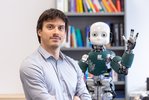Physical and Digital GenAI Avatars - Do Interactive Representations of Individual Human Persons Have Agency and Moral Responsibility?
WORKSHOP 1 | Tuesday, August 20, 14:10 - 16:25 | Workshop Room 1 (1441-110)
Moderators
Mihaela Constantinescu, Faculty of Philosophy, University of Bucharest

Mihaela Constantinescu is lecturer at the Faculty of Philosophy, University of Bucharest, Romania, and executive director of the Research Centre in Applied Ethics (CCEA). Her research includes virtue ethics, business ethics, HumanRobot Interaction, and AI ethics, with a focus on the normative interplay between the concepts of moral responsibility and moral agency in relation to individuals, organisations, and AI systems. Mihaela is the winner of an ERC Starting Grant for the project “Avatar agency. Moral responsibility at the intersection of individual, collective, and artificial social entities in emergent avatar communities” (avataResponsibility) to be implemented between 2024-2028.
Radu Uszkai, Research Center in Applied Ethics, University of Bucharest

Radu Uszkai is an Assistant Lecturer at the Bucharest University of Economic Studies (where he teaches Philosophy and Business Ethics) and a postdoctoral researcher at the Research Center in Applied Ethics (Faculty of Philosophy, University of Bucharest) within the ERC Starting Grant project avataResponsibility (“Avatar agency. Moral responsibility at the intersection of individual, collective, and artificial social entities in emergent avatar communities”). His research is mainly focused on applied ethics (AI ethics, the ethics of intellectual property), political philosophy and philosophy and pop culture.
Abstract
As either physical or digital interactive representations of human beings, avatars with generative Artificial Intelligence (GenAI Avatars) raise significant philosophical challenges because they question our traditional frameworks in which we talk about agency and the attribution of moral responsibility. Can we ascribe any form of agency to GenAI Avatars, or are we witnessing a new form of agency that is emerging at the intersection of humans and their interactive representations which can be deployed in various physical or digital spaces? Drawing from the broader discussion on the topic within Human-Robot Interaction and machine/robot ethics, the aim of this workshop is to explore potential forms of avatar agency and to analyze the normative implications for attributions of moral and legal responsibility. The workshop will combine conceptual analysis with practical examples of stateof-art humanoid robotic avatar systems and applications of health avatars in medicine.
Speaker
Diana Mocanu, Institute for Interdisciplinary Research in Legal Sciences, Université Catholique de Louvain, Belgium

Diana Mocanu is a PhD Candidate at the Université Catholique de Louvain’s Institute for Interdisciplinary Research in Legal Sciences, in the Centre for Philosophy of Law (CPDR). She pursued her doctoral studies due to a FRESH scholarship from the Belgian National Research Fund (FNRS), under the supervision of Prof. Christophe Lazaro and Prof. Anne-Lise Sibony. The theme of her research is the legal status of artificial intelligence in the European Union. Starting in September 2024, she will be joining the University of Helsinki and Prof. Kurki on their LEGACY ERC project on legal agency as a postdoc.
Artificial legal agency for social robots vs. GenAI avatars
Accounts of AI agency in legal literature have so far relied on the technical “sense-think-act paradigm”, combined with “the intentional stance”, presupposing the standard theory of agency. This is not, by far, the only option. But while the conceptual richness of the philosophy of agency is obviously not without its own difficulties, the legal domain seems plagued by a corresponding scarcity. “Liberal agency” has been the only relevant concept thereof for the better part of two centuries. However, first social robots and now, increasingly, GenAI avatars seem to mark the end of the highly rational, autonomous person as an individual legal agent. This contribution will thus pose some theoretical foundations for an account of legal agency fit for accounting for both embodied social robots as well as digital GenAI avatars’ actions in the legal domain, all while comparing the two. In so doing, it will draw insights from previous work on group agency, autonomy, and collective intentionality. The merits of a (moral) agency spectrum will also be discussed, linking it to similar conceptual views on legal personhood. Additionally, a radically egalitarian ontology of agency, distributed across groupings of human and non-human actors will also be considered, as will several other options for the stabilisation of their legal status.
Speaker
George Bogateanu, Independent Scholar

George Bogateanu has developed a career at the crossroads of gerontology, healthcare, and robotics. His expertise in integrating robotics into elder care is evident in his involvement with the social robot project "Juliet", which employs new technologies to assist elderly and dependent residents. With an educational background in diverse fields including public health ethics, AI in biomedical engineering, and research ethics, George has earned a Diploma in General Gerontology from the University of Strasbourg. He brings practical healthcare experience, supported by his studies in medicine and nursing, and is skilled in AI and new technologies in health, showing a commitment to innovating elder care with advanced solutions.
The use of avatars in medicine: optimising biological models with personal health data
In the expanding field of personalised medicine, the integration of systems biology to create medical avatars marks a significant advancement. These avatars, designed to encapsulate and optimise individual health data, aim to revolutionise medical treatment through customization. The objective is to evaluate the efficacy of health avatars in medicine, focusing on their revolutionary potential in personalised care. This approach also involves reflecting on the future directions of avatar-based methods in this field, emphasising their significant role in enhancing personalised medicine and managing complex pathologies. This opens up new perspectives for a critical involvement with the future potential of personalised health technologies in the philosophy of medical technology.
Speaker
Stefano Dafarra, Istituto Italiano di Tecnologia (IIT), Genova, Italy

Stefano Dafarra obtained his M.S. degree in Automation and Control Engineering from Politecnico di Milano in 2016. He visited the robotics lab at the Institute of Human and Machine Cognition in Pensacola, Florida in 2019. He received his Ph.D on Advanced and Humanoid robotics from the University of Genoa working at the Istituto Italiano di Tecnologia (IIT) in 2020. He is currently a Post-Doc at IIT. He led the technical activities of the iCub Team during the ANA Avatar XPrize international robotic competition. His research interests include teleoperation, optimization, optimal control, and humanoid locomotion.
Humanoid robotic avatar systems - iCub3
This talk delves into the latest developments in humanoid avatar systems and their impact on human-robot interaction. We'll explore the design and functionality of the humanoid iCub3, a flagship creation from the Istituto Italiano di Tecnologia (IIT), showcasing its capabilities across various tasks, including locomotion and facial expressions. The discussion will highlight the immersive sensory feedback that enhances these interactions, covering visual, auditory, haptic, weight, and touch modalities. Notably, remote interactions are made possible through iFeel, custom-made wearable technologies for motion and force tracking, developed by IIT. Through real-world examples, we'll unveil the practical applications of avatar systems, from remote collaborations to live engagements at prominent events.
Speaker
Radu Uszkai, Research Center in Applied Ethics, University of Bucharest

Radu Uszkai is an Assistant Lecturer at the Bucharest University of Economic Studies (where he teaches Philosophy and Business Ethics) and a postdoctoral researcher at the Research Center in Applied Ethics (Faculty of Philosophy, University of Bucharest) within the ERC Starting Grant project avataResponsibility (“Avatar agency. Moral responsibility at the intersection of individual, collective, and artificial social entities in emergent avatar communities”). His research is mainly focused on applied ethics (AI ethics, the ethics of intellectual property), political philosophy and philosophy and pop culture.
The Ethics of Human-Robotic Avatars Interaction. - Insights from Gaming
As the impending emergence and development of human - robotic avatar interactions and communities draw nearer, one useful starting point to analyse the moral conundrum at the intersection of robotic avatars, agency and moral responsibility is the world of video games. Within the virtual world of gaming, avatars are understood not only as our playable characters but, more importantly, as the embodiment of our identity. If avatars are our proxies, then we can also talk about avatar agency in that virtual environment and, potentially, about moral responsibility. The goal of my talk is to explore potential insights that the world of video games could provide for the interactions between humans and robotic avatars, especially in the wake of the complications brought about by GenAI. My talk will focus on two main questions: (i) can and should the type of control that gamers are exercising in relation to their avatar’s action be extended to physical, robotic avatars?; (ii) are solutions to the puzzle of moral responsibility for our avatar’s actions in the gaming world compatible with new types of avatars, especially those made possible by Generative AI technologies?
Speaker
Mihaela Constantinescu, Faculty of Philosophy, University of Bucharest, Rumania

Mihaela Constantinescu is lecturer at the Faculty of Philosophy, University of Bucharest, Romania, and executive director of the Research Centre in Applied Ethics (CCEA). Her research includes virtue ethics, business ethics, HumanRobot Interaction, and AI ethics, with a focus on the normative interplay between the concepts of moral responsibility and moral agency in relation to individuals, organisations, and AI systems. Mihaela is the winner of an ERC Starting Grant for the project “Avatar agency. Moral responsibility at the intersection of individual, collective, and artificial social entities in emergent avatar communities” (avataResponsibility) to be implemented between 2024-2028.
Moral responsibility and GenAI avatars
GenAI Avatars in the form of robotic avatars and digital avatars seem to challenge our prior understanding of agency as a prerequisite of moral responsibility. Future avatar uses might open the possibility of ascribing a degree-based agency to avatars and avatar controllers. We might as well witness a new form of agency emerging out of the interaction between humans and AI avatars in physical and (immersive) digital spaces. This talk highlights key challenges that various uses of GenAI avatars pose to our criteria for moral responsibility, as previously applied to individuals and collectives such as organisations. The discussion particularly highlights how GenAI avatars question our understanding of agency, traditionally grounded in ontological and epistemological claims over the physical world, with implications for the way we ascribe moral status and moral responsibility.